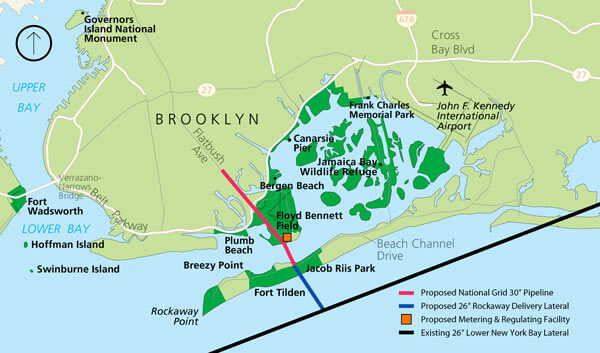By Bianca Fortis
Despite increasing opposition, energy companies National Grid and Williams Transco are moving forward to build a 3.2-mile-long pipeline that would increase the supply of natural gas in Brooklyn and Queens. A number of local groups and individuals are against the project, citing safety hazards and concerns for the environment.
In 2007, Mayor Michael Bloomberg released PlaNYC 2030, a blueprint for preparing the city for 1 million more residents. Included in the plan is an initiative to increase the use of natural gas in the city and decrease dependence on fossil fuels for power generation.
“A lot of the activists are opposing the project for environmental reasons, but what’s driving it is the city’s clean air goals,” Chris Stockton, a representative for Transco, said.
Stockton said the company already provides half the gas used in New York City. The new pipeline is just another delivery point into the city which will address a growing demand for energy, he said.
“Think of it like a freeway,” he said. “All it is is an exit ramp.”
Currently, the existing Lower New York Bay Lateral Pipeline runs parallel to the Rockaway Peninsula. The new pipeline would be built in two parts: the proposed Rockaway Delivery Lateral would branch off from the existing Lateral and run off-shore and under Jacob Riis Park. The second part, built by National Grid, would connect from Jacob Riis Park into Brooklyn along Flatbush Avenue.
National Grid has already begun construction on its piece of the project. Transco is still seeking final approval from the Federal Energy Regulatory Commission.
The pipeline will have a metering station in Floyd Bennett Field, where it will be monitored remotely, and Stockton said it will be inspected daily by local workers.
Some of the gas will be derived from under the Marcellus Shale, a rock formation that extends from western New York and down into Pennsylvania, Ohio and West Virginia. The gas, which consists primarily of methane, is extracted by a process called hydraulic fracturing, or hydrofracking, wherein a mixture of water, sand and chemicals is pumped underground to break apart rock and release gas. Proponents say natural gas is “clean energy” and can help boost the economy by creating jobs.
But hydrofracking has long been opposed by environmental activists. Concerns include methane leaks, groundwater contamination and negative effects on health.
Anti-pipeline activists point to the case of San Bruno, the San Francisco suburb that suffered a major explosion in a pipeline owned by Pacific Gas & Electric in 2010, killing eight people.
After the blast, Brigham McCown, the former head of the Pipeline and Hazardous Materials Safety Administration, publicly called for a commission to address the concern of high-pressure pipelines that run under residential areas. He also suggested creating a “no-man’s land” around the pipelines.
Jonathan Fluck, a member of the Coalition Against the Rockaway Pipeline, said his group’s primary concern is the location of the pipeline: It will run under a national park and near a wildlife preserve. A leak puts both humans and endangered species and animals at risk, Fluck said.
Permission to run the pipeline through the park was granted by the New York City Natural Gas Supply Enhancement Act, a bill passed by Congress and signed into law by President Barack Obama last year.
The legislation, introduced by U.S. Rep. Michael Grimm (R-Staten Island), authorizes the U.S. secretary of the Interior to approve permits for natural gas pipelines within the Gateway National Recreation Area in New York and New Jersey.
The bill also allows for the collection of rent from leases on any National Park Service buildings associated with the pipeline.
Fluck pointed out that the company has given a substantial amount of political contributions to lawmakers within the last couple years.
Williams Cos., the parent company of Transco, spent $3.3 million lobbying in 2012, according to data from the Center for Responsive Politics. It gave $350,000 to members of Congress within the 2012 election cycle and Grimm received $3,000 of those contributions.
The company is also seeking an exemption to the Marine Mammal Protection Act of 1972 to facilitate its underwater construction. Documents filed with the National Marine Fisheries Service state that animals may be “harassed” by noise and other vibrations during the construction period. The sea creatures that could be potentially affected include whales, dolphins, seals and porpoises.
Stockton stressed the rigorous safety program that Transco will implement, and said precautions are in place in case of severe weather storms, such as another Hurricane Sandy.
“Safety is in our DNA,” he said. “It’s the most important thing we do.”
He said the company has had no major incidents in New York in its operating history.
Since 2008, Williams Transco has been issued two federal corrective action orders for problems in other states, according to documents from PHMSA. They were both issued after explosions occurred along the pipeline.
The company has also been issued several fines since 2007. Violations include a lack of corrosion control, incorrect welding procedures and failing to keep adequate records.
An explosion at a Williams Cos. Geismar, La., chemical plant last month killed two people, but the incident was unrelated to pipelines and Stockton said an event of that magnitude was unprecedented in the company’s history. The cause of the explosion has not yet been determined.
Another growing concern of New Yorkers is radioactive radon gas. According to a study by the U.S. Geological Survey, Marcellus Shale Gas contains the gas, a known carcinogen. Activists say the radon is carried into homes right along with natural gas.
“What that basically means is that we’re going to have huge spikes in cancer rates,” Fluck said.
Stockton countered that research by pointing to other studies that have said the quantities of radon in another New York City pipeline, the Spectra Pipeline, are negligible.
Reach reporter Bianca Fortis by email at bfortis@cnglocal.com or by phone at 718-260-4546.
































